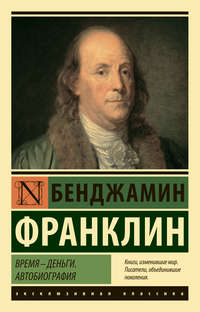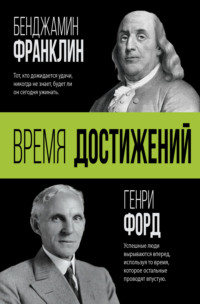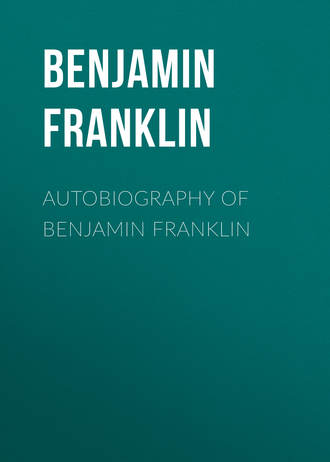 полная версия
полная версияAutobiography of Benjamin Franklin
Our captain of the packet had boasted much, before we sailed, of the swiftness of his ship; unfortunately, when we came to sea, she proved the dullest of ninety-six sail, to his no small mortification. After many conjectures respecting the cause, when we were near another ship almost as dull as ours, which, however, gain'd upon us, the captain ordered all hands to come aft, and stand as near the ensign staff as possible. We were, passengers included, about forty persons. While we stood there, the ship mended her pace, and soon left her neighbour far behind, which prov'd clearly what our captain suspected, that she was loaded too much by the head. The casks of water, it seems, had been all plac'd forward; these he therefore order'd to be mov'd further aft, on which the ship recover'd her character, and proved the best sailer in the fleet.
The captain said she had once gone at the rate of thirteen knots, which is accounted thirteen miles per hour. We had on board, as a passenger, Captain Kennedy, of the Navy, who contended that it was impossible, and that no ship ever sailed so fast, and that there must have been some error in the division of the log-line, or some mistake in heaving the log.115 A wager ensu'd between the two captains, to be decided when there should be sufficient wind. Kennedy thereupon examin'd rigorously the log-line, and, being satisfi'd with that, he determin'd to throw the log himself. Accordingly some days after, when the wind blew very fair and fresh, and the captain of the packet, Lutwidge, said he believ'd she then went at the rate of thirteen knots, Kennedy made the experiment, and own'd his wager lost.
The above fact I give for the sake of the following observation. It has been remark'd, as an imperfection in the art of ship-building, that it can never be known, till she is tried, whether a new ship will or will not be a good sailer; for that the model of a good-sailing ship has been exactly follow'd in a new one, which has prov'd, on the contrary, remarkably dull. I apprehend that this may partly be occasion'd by the different opinions of seamen respecting the modes of lading, rigging, and sailing of a ship; each has his system; and the same vessel, laden by the judgment and orders of one captain, shall sail better or worse than when by the orders of another. Besides, it scarce ever happens that a ship is form'd, fitted for the sea, and sail'd by the same person. One man builds the hull, another rigs her, a third lades and sails her. No one of these has the advantage of knowing all the ideas and experience of the others, and, therefore, cannot draw just conclusions from a combination of the whole.
Even in the simple operation of sailing when at sea, I have often observ'd different judgments in the officers who commanded the successive watches, the wind being the same. One would have the sails trimm'd sharper or flatter than another, so that they seem'd to have no certain rule to govern by. Yet I think a set of experiments might be instituted; first, to determine the most proper form of the hull for swift sailing; next, the best dimensions and properest place for the masts; then the form and quantity of sails, and their position, as the wind may be; and, lastly, the disposition of the lading. This is an age of experiments, and I think a set accurately made and combin'd would be of great use. I am persuaded, therefore, that ere long some ingenious philosopher will undertake it, to whom I wish success.
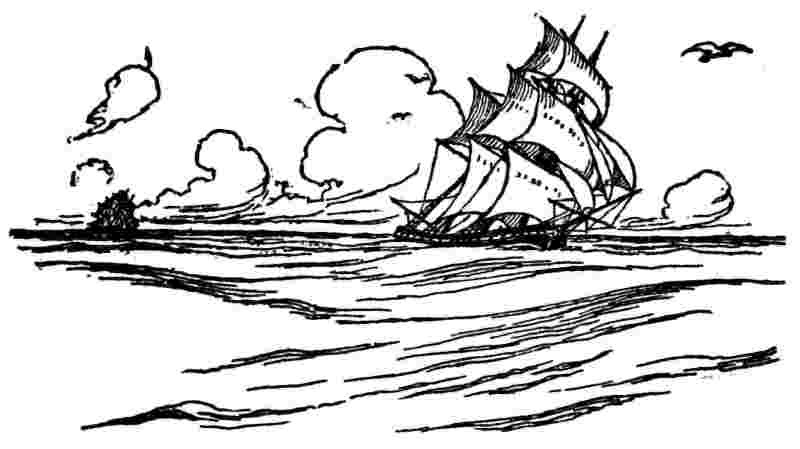
We were several times chas'd in our passage, but out-sail'd every thing, and in thirty days had soundings. We had a good observation, and the captain judg'd himself so near our port, Falmouth, that, if we made a good run in the night, we might be off the mouth of that harbor in the morning, and by running in the night might escape the notice of the enemy's privateers, who often cruis'd near the entrance of the channel. Accordingly, all the sail was set that we could possibly make, and the wind being very fresh and fair, we went right before it, and made great way. The captain, after his observation, shap'd his course, as he thought, so as to pass wide of the Scilly Isles; but it seems there is sometimes a strong indraught setting up St. George's Channel, which deceives seamen and caused the loss of Sir Cloudesley Shovel's squadron. This indraught was probably the cause of what happened to us.
We had a watchman plac'd in the bow, to whom they often called, "Look well out before there," and he as often answered, "Ay, ay"; but perhaps had his eyes shut, and was half asleep at the time, they sometimes answering, as is said, mechanically; for he did not see a light just before us, which had been hid by the studding-sails from the man at the helm, and from the rest of the watch, but by an accidental yaw of the ship was discover'd, and occasion'd a great alarm, we being very near it, the light appearing to me as big as a cartwheel. It was midnight, and our captain fast asleep; but Captain Kennedy, jumping upon deck, and seeing the danger, ordered the ship to wear round, all sails standing; an operation dangerous to the masts, but it carried us clear, and we escaped shipwreck, for we were running right upon the rocks on which the lighthouse was erected. This deliverance impressed me strongly with the utility of lighthouses, and made me resolve to encourage the building more of them in America if I should live to return there.
In the morning it was found by the soundings, etc., that we were near our port, but a thick fog hid the land from our sight. About nine o'clock the fog began to rise, and seem'd to be lifted up from the water like the curtain at a play-house, discovering underneath, the town of Falmouth, the vessels in its harbor, and the fields that surrounded it. This was a most pleasing spectacle to those who had been so long without any other prospects than the uniform view of a vacant ocean, and it gave us the more pleasure as we were now free from the anxieties which the state of war occasion'd.
I set out immediately, with my son, for London, and we only stopt a little by the way to view Stonehenge116 on Salisbury Plain, and Lord Pembroke's house and gardens, with his very curious antiquities at Wilton. We arrived in London the 27th of July, 1757.117
As soon as I was settled in a lodging Mr. Charles had provided for me, I went to visit Dr. Fothergill, to whom I was strongly recommended, and whose counsel respecting my proceedings I was advis'd to obtain. He was against an immediate complaint to government, and thought the proprietaries should first be personally appli'd to, who might possibly be induc'd by the interposition and persuasion of some private friends, to accommodate matters amicably. I then waited on my old friend and correspondent, Mr. Peter Collinson, who told me that John Hanbury, the great Virginia merchant, had requested to be informed when I should arrive, that he might carry me to Lord Granville's,118 who was then President of the Council and wished to see me as soon as possible. I agreed to go with him the next morning. Accordingly Mr. Hanbury called for me and took me in his carriage to that nobleman's, who receiv'd me with great civility; and after some questions respecting the present state of affairs in America and discourse thereupon, he said to me: "You Americans have wrong ideas of the nature of your constitution; you contend that the king's instructions to his governors are not laws, and think yourselves at liberty to regard or disregard them at your own discretion. But those instructions are not like the pocket instructions given to a minister going abroad, for regulating his conduct in some trifling point of ceremony. They are first drawn up by judges learned in the laws; they are then considered, debated, and perhaps amended in Council, after which they are signed by the king. They are then, so far as they relate to you, the law of the land, for the king is the Legislator of the Colonies,"119 I told his lordship this was new doctrine to me. I had always understood from our charters that our laws were to be made by our Assemblies, to be presented indeed to the king for his royal assent, but that being once given the king could not repeal or alter them. And as the Assemblies could not make permanent laws without his assent, so neither could he make a law for them without theirs. He assur'd me I was totally mistaken. I did not think so, however, and his lordship's conversation having a little alarm'd me as to what might be the sentiments of the court concerning us, I wrote it down as soon as I return'd to my lodgings. I recollected that about 20 years before, a clause in a bill brought into Parliament by the ministry had propos'd to make the king's instructions laws in the colonies, but the clause was thrown out by the Commons, for which we adored them as our friends and friends of liberty, till by their conduct towards us in 1765 it seem'd that they had refus'd that point of sovereignty to the king only that they might reserve it for themselves.
With his keen insight into human nature and his consequent knowledge of American character, he foresaw the inevitable result of such an attitude on the part of England. This conversation with Grenville makes these last pages of the Autobiography one of its most important parts.
After some days, Dr. Fothergill having spoken to the proprietaries, they agreed to a meeting with me at Mr. T. Penn's house in Spring Garden. The conversation at first consisted of mutual declarations of disposition to reasonable accommodations, but I suppose each party had its own ideas of what should be meant by reasonable. We then went into consideration of our several points of complaint, which I enumerated. The proprietaries justify'd their conduct as well as they could, and I the Assembly's. We now appeared very wide, and so far from each other in our opinions as to discourage all hope of agreement. However, it was concluded that I should give them the heads of our complaints in writing, and they promis'd then to consider them. I did so soon after, but they put the paper into the hands of their solicitor, Ferdinand John Paris, who managed for them all their law business in their great suit with the neighbouring proprietary of Maryland, Lord Baltimore, which had subsisted 70 years, and wrote for them all their papers and messages in their dispute with the Assembly. He was a proud, angry man, and as I had occasionally in the answers of the Assembly treated his papers with some severity, they being really weak in point of argument and haughty in expression, he had conceived a mortal enmity to me, which discovering itself whenever we met, I declin'd the proprietary's proposal that he and I should discuss the heads of complaint between our two selves, and refus'd treating with anyone but them. They then by his advice put the paper into the hands of the Attorney and Solicitor-General for their opinion and counsel upon it, where it lay unanswered a year wanting eight days, during which time I made frequent demands of an answer from the proprietaries, but without obtaining any other than that they had not yet received the opinion of the Attorney and Solicitor-General. What it was when they did receive it I never learnt, for they did not communicate it to me, but sent a long message to the Assembly drawn and signed by Paris, reciting my paper, complaining of its want of formality, as a rudeness on my part, and giving a flimsy justification of their conduct, adding that they should be willing to accommodate matters if the Assembly would send out some person of candour to treat with them for that purpose, intimating thereby that I was not such.
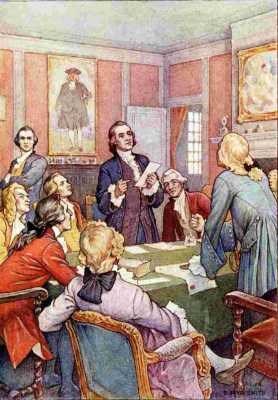
"We now appeared very wide, and so far from each other in our opinions as to discourage all hope of agreement"
The want of formality or rudeness was, probably, my not having address'd the paper to them with their assum'd titles of True and Absolute Proprietaries of the Province of Pennsylvania, which I omitted as not thinking it necessary in a paper, the intention of which was only to reduce to a certainty by writing, what in conversation I had delivered viva voce.
But during this delay, the Assembly having prevailed with Gov'r Denny to pass an act taxing the proprietary estate in common with the estates of the people, which was the grand point in dispute, they omitted answering the message.
When this act however came over, the proprietaries, counselled by Paris, determined to oppose its receiving the royal assent. Accordingly they petitioned the king in Council, and a hearing was appointed in which two lawyers were employ'd by them against the act, and two by me in support of it. They alledg'd that the act was intended to load the proprietary estate in order to spare those of the people, and that if it were suffer'd to continue in force, and the proprietaries, who were in odium with the people, left to their mercy in proportioning the taxes, they would inevitably be ruined. We reply'd that the act had no such intention, and would have no such effect. That the assessors were honest and discreet men under an oath to assess fairly and equitably, and that any advantage each of them might expect in lessening his own tax by augmenting that of the proprietaries was too trifling to induce them to perjure themselves. This is the purport of what I remember as urged by both sides, except that we insisted strongly on the mischievous consequences that must attend a repeal, for that the money, £100,000, being printed and given to the king's use, expended in his service, and now spread among the people, the repeal would strike it dead in their hands to the ruin of many, and the total discouragement of future grants, and the selfishness of the proprietors in soliciting such a general catastrophe, merely from a groundless fear of their estate being taxed too highly, was insisted on in the strongest terms. On this, Lord Mansfield, one of the counsel, rose, and beckoning me took me into the clerk's chamber, while the lawyers were pleading, and asked me if I was really of opinion that no injury would be done the proprietary estate in the execution of the act. I said certainly. "Then," says he, "you can have little objection to enter into an engagement to assure that point." I answer'd, "None at all." He then call'd in Paris, and after some discourse, his lordship's proposition was accepted on both sides; a paper to the purpose was drawn up by the Clerk of the Council, which I sign'd with Mr. Charles, who was also an Agent of the Province for their ordinary affairs, when Lord Mansfield returned to the Council Chamber, where finally the law was allowed to pass. Some changes were however recommended and we also engaged they should be made by a subsequent law, but the Assembly did not think them necessary; for one year's tax having been levied by the act before the order of Council arrived, they appointed a committee to examine the proceedings of the assessors, and on this committee they put several particular friends of the proprietaries. After a full enquiry, they unanimously sign'd a report that they found the tax had been assess'd with perfect equity.
The Assembly looked into my entering into the first part of the engagement, as an essential service to the Province, since it secured the credit of the paper money then spread over all the country. They gave me their thanks in form when I return'd. But the proprietaries were enraged at Governor Denny for having pass'd the act, and turn'd him out with threats of suing him for breach of instructions which he had given bond to observe. He, however, having done it at the instance of the General, and for His Majesty's service, and having some powerful interest at court, despis'd the threats and they were never put in execution.... [unfinished]
APPENDIX
ELECTRICAL KITE
To Peter Collinson[Philadelphia], Oct. 19, 1752.Sir,
As frequent mention is made in public papers from Europe of the success of the Philadelphia experiment for drawing the electric fire from clouds by means of pointed rods of iron erected on high buildings, &c., it may be agreeable to the curious to be informed, that the same experiment has succeeded in Philadelphia, though made in a different and more easy manner, which is as follows:
Make a small cross of two light strips of cedar, the arms so long as to reach to the four corners of a large, thin silk handkerchief when extended; tie the corners of the handkerchief to the extremities of the cross, so you have the body of a kite; which being properly accommodated with a tail, loop, and string, will rise in the air, like those made of paper; but this being of silk, is fitter to bear the wet and wind of a thunder-gust without tearing. To the top of the upright stick of the cross is to be fixed a very sharp-pointed wire, rising a foot or more above the wood. To the end of the twine, next the hand, is to be tied a silk ribbon, and where the silk and twine join, a key may be fastened. This kite is to be raised when a thunder-gust appears to be coming on, and the person who holds the string must stand within a door or window, or under some cover, so that the silk ribbon may not be wet; and care must be taken that the twine does not touch the frame of the door or window. As soon as any of the thunder clouds come over the kite, the pointed wire will draw the electric fire from them, and the kite, with all the twine will be electrified, and the loose filaments of the twine will stand out every way and be attracted by an approaching finger. And when the rain has wet the kite and twine, so that it can conduct the electric fire freely, you will find it stream out plentifully from the key on the approach of your knuckle. At this key the phial may be charged; and from electric fire thus obtained, spirits may be kindled, and all the electric experiments be performed, which are usually done by the help of a rubbed glass globe or tube, and thereby the sameness of the electric matter with that of lightning completely demonstrated.
B. Franklin.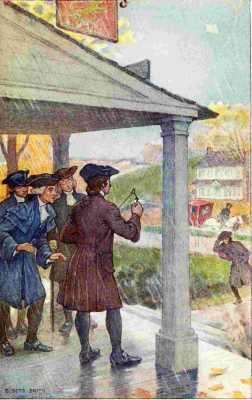
"You will find it stream out plentifully from the key on the approach of your knuckle"
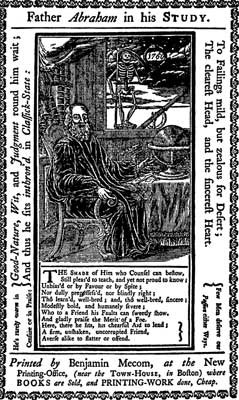
Father Abraham in his Study.
From "Father Abraham's Speech," 1760. Reproduced from a copy at the New York Public Library.
THE WAY TO WEALTH
(From "Father Abraham's Speech," forming the preface to Poor Richard's Almanac for 1758.)
It would be thought a hard Government that should tax its People one-tenth Part of their Time, to be employed in its Service. But Idleness taxes many of us much more, if we reckon all that is spent in absolute Sloth, or doing of nothing, with that which is spent in idle Employments or Amusements, that amount to nothing. Sloth, by bringing on Diseases, absolutely shortens Life. Sloth, like Rust, consumes faster than Labor wears; while the used key is always bright, as Poor Richard says. But dost thou love Life, then do not squander Time, for that's the stuff Life is made of, as Poor Richard says. How much more than is necessary do we spend in sleep, forgetting that The sleeping Fox catches no Poultry, and that There will be sleeping enough in the Grave, as Poor Richard says.
If Time be of all Things the most precious, wasting Time must be, as Poor Richard says, the greatest Prodigality; since, as he elsewhere tells us, Lost Time is never found again; and what we call Time enough, always proves little enough: Let us then up and be doing, and doing to the Purpose; so by Diligence shall we do more with less Perplexity. Sloth makes all Things difficult, but Industry all easy, as Poor Richard says; and He that riseth late must trot all Day, and shall scarce overtake his Business at Night; while Laziness travels so slowly, that Poverty soon overtakes him, as we read in Poor Richard, who adds, Drive thy Business, let not that drive thee; and Early to Bed, and early to rise, makes a Man healthy, wealthy, and wise.
Industry need not wish, and he that lives upon Hope will die fasting.
There are no Gains without Pains.
He that hath a Trade hath an Estate; and he that hath a Calling, hath an Office of Profit and Honor; but then the Trade must be worked at, and the Calling well followed, or neither the Estate nor the Office will enable us to pay our Taxes.
What though you have found no Treasure, nor has any rich Relation left you a Legacy, Diligence is the Mother of Good-luck, as Poor Richard says, and God gives all Things to Industry.
One To-day is worth two To-morrows, and farther, Have you somewhat to do To-morrow, do it To-day.
If you were a Servant, would you not be ashamed that a good Master should catch you idle? Are you then your own Master, be ashamed to catch yourself idle.
Stick to it steadily; and you will see great Effects, for Constant Dropping wears away Stones, and by Diligence and Patience the Mouse ate in two the Cable; and Little Strokes fell great Oaks.
Methinks I hear some of you say, Must a Man afford himself no Leisure? I will tell thee, my friend, what Poor Richard says, Employ thy Time well, if thou meanest to gain Leisure; and, since thou art not sure of a Minute, throw not away an Hour. Leisure, is Time for doing something useful; this Leisure the diligent Man will obtain, but the lazy Man never; so that, as Poor Richard says, A Life of Leisure and a Life of Laziness are two things.
Keep thy Shop, and thy Shop will keep thee; and again, If you would have your business done, go; if not, send.
If you would have a faithful Servant, and one that you like, serve yourself.
A little Neglect may breed great Mischief: adding, for want of a Nail the Shoe was lost; for want of a Shoe the Horse was lost; and for want of a Horse the Rider was lost, being overtaken and slain by the Enemy; all for the want of Care about a Horse-shoe Nail.
So much for Industry, my Friends, and Attention to one's own Business; but to these we must add Frugality.
What maintains one Vice, would bring up two Children. You may think perhaps, that a little Tea, or a little Punch now and then, Diet a little more costly, Clothes a little finer, and a little Entertainment now and then, can be no great Matter; but remember what Poor Richard says, Many a Little makes a Mickle.
Beware of little expenses; A small Leak will sink a great Ship; and again, Who Dainties love, shall Beggars prove; and moreover, Fools make Feasts, and wise Men eat them.
Buy what thou hast no Need of, and ere long thou shalt sell thy Necessaries.
If you would know the Value of Money, go and try to borrow some; for, he that goes a borrowing goes a sorrowing.
The second Vice is Lying, the first is running in Debt.
Lying rides upon Debt's Back.
Poverty often deprives a Man of all Spirit and Virtue: 'Tis hard for an empty Bag to stand upright.
And now to conclude, Experience keeps a dear School, but Fools will learn in no other, and scarce in that; for it is true, we may give Advice, but we cannot give Conduct, as Poor Richard says: However, remember this, They that won't be counseled, can't be helped, as Poor Richard says: and farther, That if you will not hear Reason, she'll surely rap your Knuckles.
THE WHISTLE
To Madame BrillonPassy, November 10, 1779.I am charmed with your description of Paradise, and with your plan of living there; and I approve much of your conclusion, that, in the meantime, we should draw all the good we can from this world. In my opinion, we might all draw more good from it than we do, and suffer less evil, if we would take care not to give too much for whistles. For to me it seems, that most of the unhappy people we meet with, are become so by neglect of that caution.


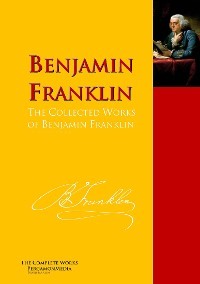
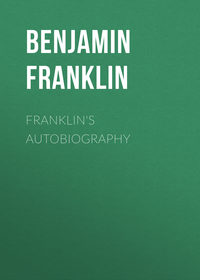
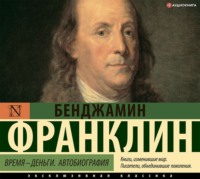

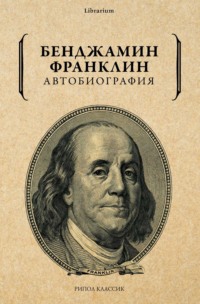
![Memoirs of Benjamin Franklin; Written by Himself. [Vol. 2 of 2]](/covers_200/24858395.jpg)
